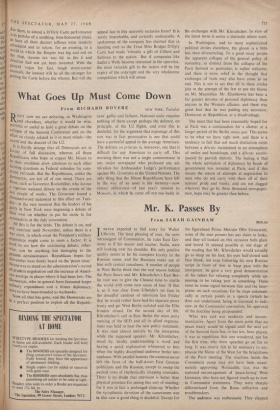What Goes Up Must Come Down
From RICHARD ROVERE NEW YORK, Tuesday RIGHT now we are debating, in Washington and elsewhere, whether it would be wise, Patriotic or useful to hold a great debate on the Collapse of the Summit Conference and on the affair so closely related to it in most minds—the ascent and the descent of the U2.
It is hardly strange that all Democrats are in f„avour of full discussion, whereas all those Republicans who hope or expect Mr. Nixon to be their candidate draw attention to such other burning questions as Federal subsidies for corn- Muter railroads. But the Republicans, unlike the 'Democrats, are not all of one mind. There are those, such as Governor Rockefeller, who favour a vigorous national debate on the events of the last couple of weeks. The Governor issued a thousand-word statement to this effect on Tues- claY—at the very moment that the leaders of his Party in New York were beginning a debate of their own on whether to put his name in for nomination at the July convention. All this is for the birds. The debate is on, and will Continue until November, unless there is a war crisis, in which event the President's military experience might come to seem a factor. It is hard to see how the continuing debate, other- Wise, can be anything but damaging to the Present administration. Republican hopes for November were firmly based on the 'peace issue.' Nixon was to stand on the administration's record °f Prudent negotiation and the increase of Ameri- can prestige in places where it had been low. The Democrats, who in general have favoured larger Military expenditure and a firmer diplomacy, Were to have been branded as warhawks.
Now all that has gone, and the Democrats are to a perfect position to exploit all the Republi- cans' gaffes and failures. National unity requires nothing of them except perhaps the defence, on principle, of the U2 flights, and even this is doubtful, for the argument that espionage of this sort was in fact provocative is one that could have a powerful appeal to the average American. The defence en Principe is, moreover, one that is difficult for any American to carry off. This morning there was not a single commentator in any major newspapei who professed any ad- miration for Ambassador Lodge's performance against Mr. Gromyko at the United Nations. The only thing that the Nixon Republicans have left in the way of an asset is the memory—now almost obliterated—of last year's mission to Moscow, in which he came off not too badly in his exchanges with Mr. Khrushchev. In view of the latest turns it seems a distinctly minor asset.
In Washington, and in more sophisticated political circles elsewhere, the gloom is a little less than all-encircling. To a good many people. the apparent collapse of the general policy of summitry, as distinct from the collapse of the Paris Summit in particular, is rather welcome, and there is some relief in the thought that exchanges of visits may also have come to an end. This is not to say that all in these circles join in the attempt of the few to put the blame on Mr. Macmillan. Mr. Eisenhower has been a far greater devotee of personal diplomacy than anyone in the Western alliance, and there was great fear that he was putting any successor, Democrat or Republican, at a disadvantage.
The most that had been reasonably hoped for at Paris was a continuation for a shorter or a longer period of the Berlin status quo. This seems to be what we have right now, and there is a tendency to feel that not much distinction exists between a detente maintained in an atmosphere of smiles and handclasps, and a detente accom- panied by peevish rhetoric. The feeling is that the whole unwisdom of diplomacy by heads of government was revealed at Paris, and if this means the return of attempts at negotiation to men who do not carry with them all of their nations' pride and vanity, and are not dogged wherever they go by three thousand newspaper- men, hope may be greater than before.






































 Previous page
Previous page